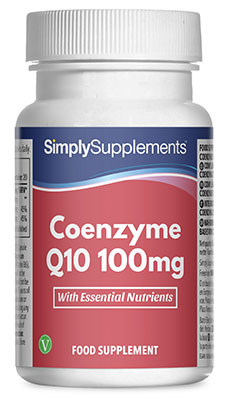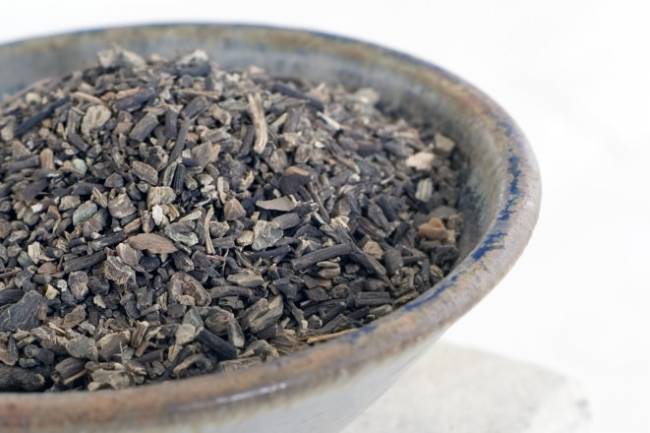Health Benefits of Co Enzyme Q10

Co Enzyme Q10 (COQ10), which is also known as Ubiquinone, is a vitamin-like nutrient which is naturally found in the mitochondria of every one of our body’s cells. The mitochondria are commonly referred to as the ‘power house’ of the cell, because this is where energy production occurs. Within the mitochondria is COQ10 which has been labelled as the mitochondrial spark plug.
COQ10 can be obtained in some amounts through the diet by the ingestion of beef, pork and chicken. The concentration of COQ10 in this meat is highest in offal, with smaller amounts in more commonly consumed cuts. Since achieving a high amount is difficult through foods alone, many are supplementing with COQ10 to achieve the levels that have been shown in research to exert benefits.
Continue reading this article to discover the potential health benefits of COQ10 and whether this supplement would be a good addition to your lifestyle.
What are the Benefits of Co Enzyme Q10?
COQ10 is a molecule which has received notable attention from the scientific community, with there being hundreds of published studies. Let’s explore this research in more detail:
Cardiovascular Health
The heart is the most important muscle in the body, and keeping this organ and its network of blood vessels working efficiently is crucial for good health, wellbeing and quality of life. Various studies have shown that the cardiovascular system can be improved in numerous ways...
Blood Vessel Function
Firstly, there are a range of high-quality studies that are in agreement that COQ10 supplementation can improve endothelial function - the healthy workings of our blood vessels. Poor blood vessel function can be caused by numerous factors such as smoking, diabetes, obesity and high levels of oxidative stress, which can impair blood flow and increase the risk of suffering from a cardiovascular event such as a heart-attack.
One study published by the European Heart Journal in 2006 discovered that a daily provision of 100mg of COQ10 improved the cardiovascular health of patients suffering from Ischaemia. The results show that COQ10 was effective at improving the power and efficiency of the left ventricle, which is the muscle in the heart that is responsible for pumping oxygen-rich blood around the body. It was also found that blood vessel function and quality of life was enhanced. These results appeared to be even more impressive when paired with regular exercise. Importantly, these improvements came with no side-effects, suggesting that COQ10 is both safe and effective.
Another study published by the same journal the following year reinforced these results by finding that supplementing with 300mg of COQ10 daily improved antioxidant levels in the walls of blood vessels, improved vasodilation (the ability of the blood vessels to widen) and exercise performance during a maximal exercise test when compared to participants taking a placebo. Performance during a maximal exercise test is a great indicator of overall health, as it shows that the body has a powerful cardiovascular system and can utilise a large amount of oxygen.
Experts in the field believe that these positive results occur through multiple actions. Firstly, it is thought that COQ10 helps to maintain healthy levels of nitric oxide. Nitric oxide is a well-researched signalling molecule which is very important for vasoregulation, the widening and narrowing of blood vessels to ensure blood reaches the places requiring it most. Similarly, it is thought that COQ10 can decrease oxidative damage caused to the fats, which provide structure to our cells. This reduction in oxidative stress helps to maintain the structure and efficiency of blood vessels to support good cardiovascular health.
Blood Pressure
 According to Blood Pressure UK, 31% of men and 26% of women suffer from high blood pressure (hypertension). It is well-known that having high blood pressure is a risk factor for cardiovascular disease, and can also cause complications to the kidneys, eyes and brain, so managing blood pressure is incredibly important.
According to Blood Pressure UK, 31% of men and 26% of women suffer from high blood pressure (hypertension). It is well-known that having high blood pressure is a risk factor for cardiovascular disease, and can also cause complications to the kidneys, eyes and brain, so managing blood pressure is incredibly important.
Aside from improving blood vessel function, COQ10 supplementation has also been shown consistently to decrease both systolic and diastolic blood pressure. Systolic is the top number on a blood pressure reading, and indicates the pressure of our blood when the heart is contracted. Conversely, diastolic represents the bottom number and is the pressure of the blood when the heart is in between beats.
A meta-analysis conducted on the effectiveness of COQ10 assessed how effective the compound was at reducing blood pressure. This study found that on average, COQ10 supplementation reduced systolic blood pressure by 11mmHg, and diastolic blood pressure by 8mmHg, which is an impressive finding. This study is strong because it is a meta-analysis, which groups the results of studies together to provide stronger conclusions. However, as this meta-analysis only analysed 3 studies in total, results must be interpreted cautiously.
The findings of the meta-analysis are reinforced by a further study. This investigation, which was conducted in diabetic patients with high cholesterol, found that 100mg of COQ10 taken twice daily for 12 weeks was effective at decreasing both systolic and diastolic blood pressure to a significant degree.
Furthermore, this supplement regime also decreased HbA1C, which is the gold standard measurement of blood sugar control. This means that patients improved their diabetes through the daily provision of COQ10.
Fibromyalgia
Fibromyalgia is a chronic condition which causes pain throughout the body, and can also lead to fatigue, muscle stiffness, difficulty sleeping and irritable bowel syndrome (IBS). The cause of this condition is not currently known, but it is thought that almost 5% of the population may be affected by fibromyalgia to some degree. As a result of this, methods to combat the symptoms are highly sought-after by those who want to improve their quality of life. One method which is backed by scientific findings is COQ10 supplementation.
One study published in 2013 found that 20 participants taking 300mg daily for 40 days saw substantial reductions in pain, fatigue and morning tiredness. They also experienced improvements in levels of inflammation, antioxidant activity and mitochondria function. Another study published around the same time found that symptoms of fibromyalgia are associated with low levels of COQ10. Furthermore, correcting this deficiency with a daily provision lead to a significant improvement in the prevalence and severity of headache symptoms.
Although research into the treatment of fibromyalgia is in its infancy, the findings from these preliminary studies are promising and will surely pave the way for future investigations.
Peyronie’s Disease
Peyronie’s disease is a penile condition caused by fibrous scar tissue developing inside the penis which can lead to abnormal curvature, painful erections or impotence. Up until recently, there has been no oral medication that has shown to be beneficial for this condition.
Sufferers of Peyronie’s disease may now have a safe and effective way to combat symptoms and disease progression, after findings from a high-quality study was published in 2010 showing the effectiveness of COQ10 supplementation. This study recruited 186 participants who suffered from early chronic peyronie’s disease. These participants were randomly assigned to either take 300mg of COQ10 per day, or a daily placebo over a 6 month period.
At the end of the 6 month trial, it was found that the size of the plaque and the curvature of the penis were significantly decreased, whereas the placebo group saw slight increases. The group who took the COQ10 also saw vast improvements in erectile function and decreases in pain. Most impressive of all, only 13.6% of participants in the COQ10 group experienced disease progression, which is substantially lower than the 56.1% in the control group. The researchers believed that these results were due to the powerful antioxidant properties of COQ10 causing a reduction in oxidative stress and inflammation in penile tissue.
Who Should Use COQ10?
COQ10 is most popularly taken by those looking to increase energy levels, given its role into energy production within the mitochondria. However, it is also effective for those who suffer with cardiovascular complications, fibromyalgia or peyronie’s disease.
COQ10 is a highly recommended supplement for those who have previously had a heart attack, as research has shown that supplementation following a heart attack improves left ventricle function, and reduces angina and irregular heartbeats. Similarly, research has shown that those who have previously had a cardiac event are almost 20% less likely to suffer another one when taking COQ10 on a long term basis.
COQ10 is frequently recommended to those who take statin medication in an attempt to reduce cholesterol levels. Statin usage over the long term is known to reduce levels of COQ10, which can have adverse effects on heart health and also contribute to depression. So to benefit from the statin medication, there is a growing body of evidence that shows COQ10 supplementation to be a worthwhile dietary addition.
Smokers may also benefit from COQ10 supplementation as it has been shown that tobacco usage reduces the bodies COQ10 content.
How Much Co Enzyme Q10 Should I Take?
From the plethora of scientific research into the effects of COQ10, it appears that a daily dose of 100-300mg is most effective, with research into higher doses failing to provide further benefits. As it is a fat -soluble compound, it is important to take alongside a meal that contains fat, to maximise absorption and the effectiveness. There is also evidence to show that the absorption of COQ10 is enhanced when taken alongside grapefruit juice.
What Are the Side-Effects of Taking Co Enzyme Q10?
Although COQ10 is naturally occurring and is widely regarded as a safe supplement, especially when taken i n doses of 300mg or lower, there have been mild side effects reported in some individuals. The most common of these seem to be mild insomnia, rashes, nausea, dizziness, headaches and heartburn. If side effects such as these occur when supplementing with COQ10, it is recommended that you stop taking it.
Summary
COQ10 is a highly popular supplement and is taken for a variety of reasons. Hopefully, this article has given you the information you need to assess whether COQ10 would be a good addition to your dietary regime. Here are the take-home points:
• COQ10 is a naturally occurring vitamin-like substance that is essential for energy production and survival. Although it can be found in certain animal-based foods many choose to take a daily COQ10 supplement.
• COQ10 is popularly taken to support energy levels, but the research is the strongest for its role in helping regulate blood pressure, blood vessel function and the health of the heart following a cardiac event.
• There is also strong preliminary evidence for COQ10 reducing the symptoms of fibromyalgia and peyronie’s disease.
• COQ10 is also highly recommended for smokers or individuals who are using statins to combat high cholesterol levels. Unfortunately statin usage is known to substantially reduce COQ10 levels and this can counteract the positive effects of the statins.
• Results from clinical trials suggest that the optimal dosage is between 100-300mg per day. As COQ10 is fat-soluble, it needs to be taken with a meal containing fat to be effectively absorbed.
• COQ10 is well known to be a safe supplement, but minor side effects such as mild insomnia, rashes, headaches and nausea can sometimes be experienced.
Sources:
https://www.ncbi.nlm.nih.gov/pubmed/17644511
https://www.ncbi.nlm.nih.gov/pubmed/16882678
https://www.ncbi.nlm.nih.gov/pubmed/10459507
https://www.ncbi.nlm.nih.gov/pubmed/19821418
https://www.ncbi.nlm.nih.gov/pubmed/12428181
https://www.ncbi.nlm.nih.gov/pubmed/23458405
https://www.ncbi.nlm.nih.gov/pubmed/22532869
https://www.ncbi.nlm.nih.gov/pubmed/20720560
https://www.ncbi.nlm.nih.gov/pubmed/19017509
https://www.ncbi.nlm.nih.gov/pubmed/20010493
https://www.ncbi.nlm.nih.gov/pubmed/9825179
https://www.ncbi.nlm.nih.gov/pubmed/12841346

 Nicole
Nicole 

























